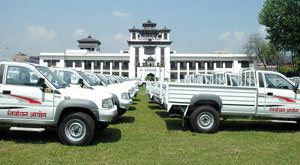|
|
| ALL LINED UP AND WAITING: The Election Commission's parking lot is filling up with pickups needed for the elections even though the polls now look unlikely before October. |
Nepali politics may look hopelessly tangled at the moment, but things can be resolved with some fairly easy steps. The prerequisites are broad political will and an agreement by the parties to tone down the grandstanding.
. The eight parties need to come together to admit what they have always known: that elections to the constituent assembly are not possible in June. Then they agree on a date in October after the festivals.
It's not the end of the world to postpone the election, as Ian Martin keeps saying, especially when the people, the parties, and the election commission are so unprepared. Better a delayed election than a defective election. The reason this is such a big issue is because the Maoists and the parties have made the date a matter of prestige. Someone just has to make sure the king and his praetorian guards don't mess around.
. The Maoist leadership has its own reasons for talking tough and issuing ultimatums on republic. There is a lot of impatience in the rank-and-file which the top comrades have themselves whipped up. Pressure is building up on Pushpa Kamal Dahal from his deputies on policy issues and on India's role. But the comrades have to learn to differentiate between radical slogans meant for internal party consumption and what is in the national interest. Attacking police stations in Banke and Bardiya, failing to rein in the YCL, and saying confiscated property won't be returned prove to everyone they aren't ready to be a legitimate political party.
. All rights activists and those clamouring for ethnic and geographical representation need to be convinced by the politicians that many of their demands can only be discussed and decided by the constituent assembly. It may be counterproductive for their own cause to put the cart before the horse.
. To kickstart the madhes negotiations, a symbolic gesture like the transfer of Home Minister Sitaula to another portfolio is urgent. The Maoists refused to let that happen in the interim government, but now they need to be realistic. No one will lose face if health reasons are cited. The madhes needs immediate attention and Peace Minister Poudel is underestimating the seriousness of the crisis (see p 10-11). And while we are at it, isn't it time for Girija Prasad Koirala to pass on the baton while he is still relatively well-liked?



